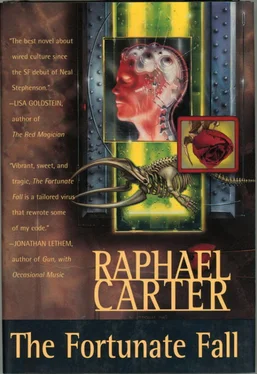Raphael Carter - The Fortunate Fall
Здесь есть возможность читать онлайн «Raphael Carter - The Fortunate Fall» весь текст электронной книги совершенно бесплатно (целиком полную версию без сокращений). В некоторых случаях можно слушать аудио, скачать через торрент в формате fb2 и присутствует краткое содержание. Город: New York, Год выпуска: 1996, ISBN: 1996, Издательство: Tor Books, Жанр: Киберпанк, на английском языке. Описание произведения, (предисловие) а так же отзывы посетителей доступны на портале библиотеки ЛибКат.
- Название:The Fortunate Fall
- Автор:
- Издательство:Tor Books
- Жанр:
- Год:1996
- Город:New York
- ISBN:0-312-86034-X
- Рейтинг книги:3 / 5. Голосов: 1
-
Избранное:Добавить в избранное
- Отзывы:
-
Ваша оценка:
- 60
- 1
- 2
- 3
- 4
- 5
The Fortunate Fall: краткое содержание, описание и аннотация
Предлагаем к чтению аннотацию, описание, краткое содержание или предисловие (зависит от того, что написал сам автор книги «The Fortunate Fall»). Если вы не нашли необходимую информацию о книге — напишите в комментариях, мы постараемся отыскать её.
“Gripping…. One of the most promising SF debuts in recent years”.
—“Publisher’s Weekly” starred review
The Fortunate Fall — читать онлайн бесплатно полную книгу (весь текст) целиком
Ниже представлен текст книги, разбитый по страницам. Система сохранения места последней прочитанной страницы, позволяет с удобством читать онлайн бесплатно книгу «The Fortunate Fall», без необходимости каждый раз заново искать на чём Вы остановились. Поставьте закладку, и сможете в любой момент перейти на страницу, на которой закончили чтение.
Интервал:
Закладка:
When she was finished I said, exhaustedly, Keishi?
“Yes?”
Next time I ask you a yes or no question, give me a yes or no answer, OK?
“OK. Umm, I mean yes.”
Thank you.
Keishi’s lecture had forced an awkward pause in my conversation with Voskresenye. To end it I asked why he hadn’t tried scrubbing the data, instead of encoding it.
“Because by that time I had realized that destroying data wouldn’t have weakened their grip. I needed a bigger bomb.”
“What kind of bomb?”
“It has not been set off yet. Perhaps it does not exist. —Here we are; this is our bubble.”
“Where?”
“Right in front of you.”
We had come to a little open-air cafe on Nevsky itself, crammed with customers and visible to hundreds of passers-by. Overlooking it were two surveillance cameras mounted on lampposts. The cameras were at least twenty years out of date, since we could see them; but that didn’t make them any less effective.
“You must be kidding,” I said. “I’m not going to sit here and discuss your career as a terrorist where a thousand wired people can see us. Not to mention those cameras. I thought you were taking me someplace unsurveilled.”
“At the moment, this is the most secure spot in the Russian Historical Nation. If you will kindly refrain from looking in my direction for a moment, I will demonstrate.”
I was a little edgy about turning my back on him, but I would have felt foolish saying so, so I averted my eyes.
“Thank you. Now, dearest elephant, can you tell me how many fingers I am holding up?”
My face went numb, and for a moment I thought he’d done it. But it was Keishi’s voice that came from my mouth: “There’s no need for games. As long as you’re in the bubble, I can’t see you unless she looks at you. You’re secure.”
Don’t ever do that again, I subvocalized, gasping for air as the sensation in my face returned.
“I’m sorry. But he did ask, and I can’t get at any other speakers—”
I am not a speaker. Keep your mind to yourself.
“I said I was sorry.”
Later! I don’t want to hear another word from you until this interview is over.
“Why don’t you just send me to my room?”
I imagined myself filling out a repartnering form, and she responded with silence.
“Trouble controlling the elephant?” Voskresenye said. “In the circus they use hooks, I think.”
“I’ll have to look into that,” I said.
“Are you now confident that we can safely talk here?”
“I believe we’re safe from cameras,” I said. “But what if someone overhears us? The Postcops may not be able to pick that up, but Weavers can.”
“A legitimate worry. I will be keeping tabs on the minds in our vicinity; however, you might wish to have your screener double-check. It can’t hurt, and it would surely take most of her brainpower, so it might keep her quiet.”
“Tell him I could watch everyone in Leningrad and never miss the bandwidth!”
I pictured myself thumbing the form and handing it in. Keep an eye on them, but don’t say a word unless you see something. I mean it.
We found a table in the shade. As he sat across from me, I noticed that he was sweating under his out-of-season overcoat. When water and menus had been brought, I said, “Why don’t you start by telling me why you’re dressed for snow in this weather?”
“I will explain; but first I suggest you have your screener alter my features. The events I will retell may be safely Netcast, but my face may be familiar to the Post police.”
“Go ahead, Keishi,” I said, and then subvoked: Don’t tell me how you’re doing it, just do it.
His face morphed through a series of subtle changes that, collectively, left it unrecognizable.
“Maybe you should take out the sockets, too,” I said. “They’re pretty distinctive.”
“I’m afraid they are essential to the story,” Voskresenye put in. “However, there are others still alive who are socketed much as I am, so it should not matter.”
“All right then. Now, about that overcoat.”
“Since when do you cover fashion?” Keishi whispered; I ignored her.
“It is uncomfortable, yes, but I did not wish to call attention to myself. And while an overcoat in April might draw the occasional glance, I think you’ll agree that this would be substantially more indiscreet.” Screening his hand from the sidewalk with a menu, he took off one glove to reveal the structure of metal and insulated wire that covered his hand. Steel slid against oiled steel to lift one of his fingers, and the tangle of wires on his skin shifted uneasily with the motion.
“Without this… device, you are paralyzed?”
“Nearly so, yes. I can move a little, but I cannot walk. And without the wires, I’m quite atactile. My mind and my body no longer talk to each other the way they used to; like so many couples nowadays, they prefer to interact through a machine.”
“May I ask… an accident? A degenerative disease?”
“Yes, and yes. An accident with a degenerative disease named Derzhavin.”
“Aleksandr Derzhavin?” Unassisted, I would not have known the name, but Keishi’s moistdisk had woven itself so seamlessly into my memory that I could not keep a note of horror out of my voice. “You were a victim of Derzhavin?”
“Victim is such a loaded term,” he said, calmly replacing the glove. “I have a great deal to thank the man for, including much of my current bandwidth and all of my continued mobility at my advanced age. No, not his victim. In the beginning I was his experimental subject, then his lab assistant, and eventually—” and here I heard the whirr of clockwork as he picked up his water glass “—a great deal more.”
“I thought Derzhavin did his experiments on Kazakhs, not politicals.”
“Kazakhs and the mentally retarded. And by the time I met him, I fit that latter description very well. Read the marks for yourself.” He pulled up his coat sleeve.
As I looked for the Guardian tattoo, I saw that the steel rods that controlled his hands were connected to a hard black shell that started just below his wrists. Keishi, I subvoked, give me four hundred percent, quick. When the magnification kicked in, I could see the rows of copper needles that anchored the carapace into his skin.
“You understand the code?” he prompted.
I canceled the zoom and looked back at the thirty-two squares etched into his skin with magnetic ink. Keishi’s moistdisk helped me recognize the blackened sixth, nineteenth, and twenty-sixth boxes as signifying “irreparable but nonhereditary organic brain defects.”
“I guess they were wrong about its being irreparable.”
“On the contrary, it has not been and cannot be repaired. But the right sort of wiring can compensate.”
“How did you go from a political to a six-nineteen?”
Before he could answer, the waiter returned to take our orders. I had not opened my menu, so I asked for black coffee and a ham sandwich. After a long discussion about ingredients, Voskresenye commanded cabbage pirozhki, which the impatient waiter twice assured him were free of meat.
“You are vegetarian?”
“‘My food is not that of man,’” he quoted; “‘I do not destroy the lamb and the kid to glut my appetite; acorns and berries afford me sufficient nourishment.’”
“Gandhi,” I hazarded.
“No,” he said. “Frankenstein’s Creature. Gandhi, I imagine, would not have been so arrogant, but for me it’s most appropriate.”
I frowned. “I don’t remember—”
“Not the film, the book. A preclassical allusion, by the modern reckoning. Forgive me; I have grown too used to being my own audience.”
Читать дальшеИнтервал:
Закладка:
Похожие книги на «The Fortunate Fall»
Представляем Вашему вниманию похожие книги на «The Fortunate Fall» списком для выбора. Мы отобрали схожую по названию и смыслу литературу в надежде предоставить читателям больше вариантов отыскать новые, интересные, ещё непрочитанные произведения.
Обсуждение, отзывы о книге «The Fortunate Fall» и просто собственные мнения читателей. Оставьте ваши комментарии, напишите, что Вы думаете о произведении, его смысле или главных героях. Укажите что конкретно понравилось, а что нет, и почему Вы так считаете.












